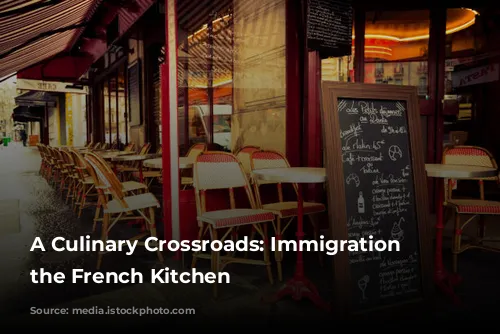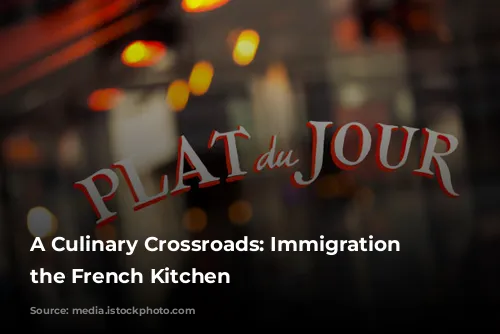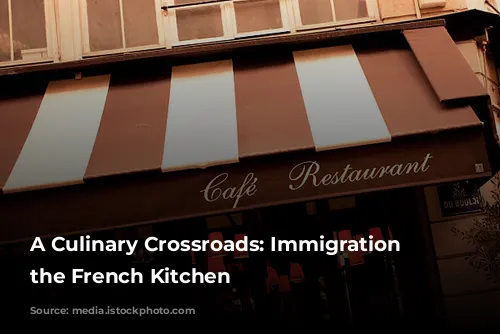Imagine yourself strolling down the charming Rue Bretagne in Paris, one of the city’s most vibrant bar streets. As the sun dips low, the terrace of Le Pinardier, a quintessential French bistro, comes alive with the buzz of conversation and the clinking of glasses. The air is thick with the aroma of freshly baked bread and ripe cheese, as regulars indulge in a classic French experience, savoring local wines alongside delectable charcuterie. But behind the scenes, a different story unfolds – a story that reveals the hidden heart of French cuisine, one heavily reliant on immigrant labor.
While patrons enjoy their leisurely evening, a young chef named Sazal Saha toils tirelessly in the kitchen, just a stone’s throw away. Originally from Bangladesh, Saha has become an integral part of Le Pinardier’s culinary team, dedicating his skills and passion to crafting delicious meals for discerning diners. He arrived in France five years ago, eager to learn the art of cooking, and after honing his craft at the prestigious Joliet-Curie School, he joined the bistro, becoming its sole chef.
Saha’s journey in the French kitchen is a microcosm of a broader narrative that is unfolding across the country, especially in bustling Paris. The hospitality industry, a cornerstone of the French economy, thrives on the contributions of immigrants, particularly in the realm of cuisine. These skilled individuals, hailing from diverse backgrounds, are the unseen hands that create the gastronomic delights that draw tourists from every corner of the globe.

A Vital Force: The Role of Immigrants in French Cuisine
Statistics paint a stark yet compelling picture. A staggering 25% of French cooks come from outside the European Union, according to former French Labor Minister Olivier Dussopt. In the heart of Paris, this reliance on immigrant labor is even more pronounced, with nearly half of the city’s chefs hailing from immigrant backgrounds. They are the backbone of the French culinary landscape, bringing their expertise and passion to the kitchens of bistros, restaurants, and even Michelin-starred establishments.
At Le Pinardier, Florian Mousson, the owner, recognizes the invaluable contribution of immigrant workers. He candidly admits that his business wouldn’t survive without them. “Most of the people working in kitchens [in Paris] are either from Bangladesh or Sri Lanka,” he notes, emphasizing the vital role they play in shaping the city’s culinary scene. In other parts of France, particularly in the south, restaurants rely heavily on immigrants from the Comoros, a former French colony.
A Challenging Reality: The Demanding World of Restaurant Work
While these dedicated individuals contribute significantly to the success of the French culinary scene, their work comes at a cost. The kitchen is a demanding environment, characterized by long hours, grueling shifts, and often cramped conditions. Mousson acknowledges the tough realities of the job, saying, “It’s a tough job. You work standing up, you work evenings and weekends, you put in long hours, and it’s very hot in the kitchen.” This physically and mentally taxing work is becoming increasingly difficult to fill with French nationals, leading to a growing reliance on immigrant labor.
Beyond Economics: A Matter of Skill and Dedication
Some might argue that restaurant owners favor immigrant workers because they offer cheaper labor. However, Mousson vehemently dismisses this notion, emphasizing that the primary factor in hiring is skill, dedication, and a willingness to go the extra mile. “I don’t care if my cook is French or a foreigner,” he asserts. “But when you put out an ad looking for a chef, for every eight or nine foreign CVs you receive, you get one French CV, so even statistically speaking, you’re more likely to hire a foreigner.” Saha, for example, earns a respectable salary, reflecting the demanding nature of his role. Mousson emphasizes that it’s not low wages that draw workers to the kitchen; it’s the passion and commitment required to excel in such a challenging environment.
Saha’s experience underscores the dedication and talent that immigrant chefs bring to the French culinary landscape. He arrived in France with limited knowledge of French cuisine but quickly immersed himself in the world of cheese, mastering the art of working with this iconic French ingredient. His willingness to learn and adapt, coupled with his unwavering commitment to his craft, are testament to the valuable contributions of immigrant workers.
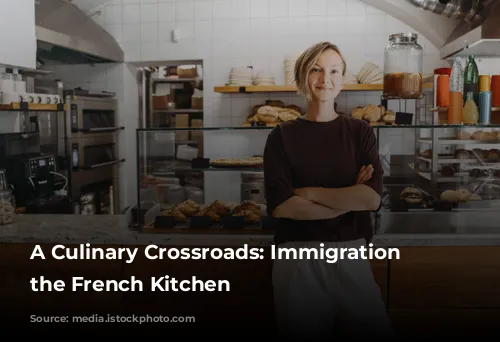
A Looming Shadow: Anti-Immigration Sentiment and Its Impact
While Saha thrives in his adopted country, a new political reality is casting a shadow over his future. The rise of the far-right National Rally party, fueled by anti-immigration sentiment, has brought anxieties to the forefront. National Rally, now the dominant force in French politics, advocates for stricter immigration controls and preferential treatment for French citizens in the social welfare system. This rhetoric has left Saha feeling apprehensive about his future in a country he has come to love.
“I am a little worried. I believe their decision is not correct,” he says, expressing his concern about the potential impact of these policies on his life and the lives of other immigrants like him. He questions the rationale behind these policies, noting that immigrants contribute significantly to the French economy and society. “We are here, we are not doing bad things, we are working here, we are paying taxes, we are paying everything like all French people,” he states, highlighting the contributions of immigrants to the French fabric.
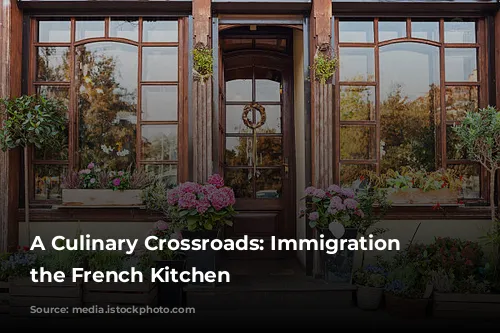
Looking Ahead: A Hopeful Future for the Culinary Landscape
Despite the uncertainties of the political landscape, Saha remains hopeful. He finds immense satisfaction in his work, taking pride in his contributions to the French culinary scene. “I am proud to work in a French restaurant. I like it. I love it,” he says, expressing his passion for his profession and his love for his adopted country. His story, like those of countless other immigrant chefs, demonstrates the invaluable role they play in shaping the vibrant culinary tapestry of France. As the country navigates its political challenges, it’s crucial to remember that the future of French cuisine, and indeed, the fabric of French society, is intertwined with the contributions of its diverse immigrant population.
